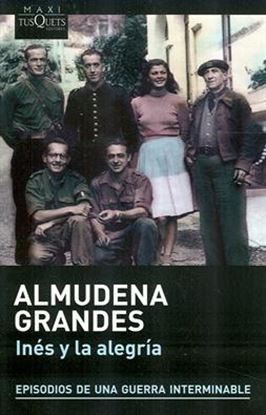

INES Y LA ALEGRIA (BOL)
Inés y la alegría: Toulouse, 1939. Carmen de Pedro, responsable en Francia de los diezmados comunistas españoles, se cruza con Jesús Monzón; años después, en 1944, Monzón contará con un ejército de hombres dispuestos a invadir España. Entre ellos está Galán, quien cree que, tras el desembarco aliado y la retirada de los alemanes, es posible establecer un gobierno republicano en Viella. No lejos de allí, Inés, que apoyó la causa republicana durante la guerra, oye a escondidas el anuncio de la operación Reconquista de España en Radio Pirenaica, y se arma de valor, y de secreta alegría, para dejar atrás los peores años de su vida.
800
600
LAS EDADES DE LULU (MAXI) (BOL)
Las edades de Lulú: Sumida todavía en los temores de una infancia carente de afecto, Lulú, una niña de quince años, es seducida por Pablo, el amigo de su hermano mayor por el que desde pequeña siente una rendida fascinación. Después de esta primera experiencia, Lulú, niña eterna, acepta el desafío de prolongar indefinidamente, en su peculiar relación sexual, el juego amoroso de la iniciación y el sometimiento. Pero el sortilegio se rompe cuando Lulú, ya con treinta años, se precipita, indefensa pero febrilmente, en el infierno de los deseos peligrosos.
850
638
VIENTOS DE CUARESMA (BOL)
En los infernales días de la primavera cubana en que llegan los vientos calientes del sur, coincidiendo con la Cuaresma, al teniente Mario Conde, que acaba de conocer a Karina, una mujer bella y deslumbrante, aficionada al jazz y al saxo, le encargan una delicada investigación. Una joven profesora de química del mismo preuniversitario donde años atrás estudió Conde ha sido asesinada en su apartamento, en el que aparecen además restos de marihuana. Así, al investigar la vida de la profesora, de impoluto expediente académico y político,
Conde entra en un mundo en descomposición, donde el arribismo, el tráfico de influencias, el consumo de drogas y el fraude revelan el lado oscuro de la sociedad cubana contemporánea.
850
638











